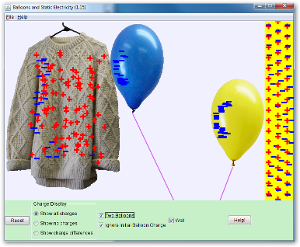lunes, 30 de septiembre de 2013
domingo, 29 de septiembre de 2013
Entrenamiento matemático
A continuación se presenta un ejercicio de la Olimpiada Matemática Argentina (OMA) para que vayan entrenado
miércoles, 25 de septiembre de 2013
Teorema de Pitágoras
En el siguiente Link vas a poder poner a prueba cuánto sabes sobre el Teorema de Pitágoras
Quedémonos cargados
A partir de la siguiente aplicación responder las siguientes preguntas:
a. Explicar por qué se carga el globo al frotarlo con el sweater
b. Explicar por qué el al soltar el globo en la zona blanca este se mueve hacia el sweater
c. ¿Qué sucede con las cargas que están sobre la pared al acercar el globo cargado? ¿Por qué?
d. Dar los nombres de los distintos tipo de inducción de cargas que pueden vislumbrarse en la aplicación y dar tres ejemplos de la vida cotidiana de cada uno de ellos.
e. Explicar el efecto punta, con sus palabras, y dar una explicación del por qué no es conveniente estar debajo de un árbol durante una tormenta eléctrica.
Estas respuestas deben ser enviadas por mail al profesor al finalizar la clase.
a. Explicar por qué se carga el globo al frotarlo con el sweater
b. Explicar por qué el al soltar el globo en la zona blanca este se mueve hacia el sweater
c. ¿Qué sucede con las cargas que están sobre la pared al acercar el globo cargado? ¿Por qué?
d. Dar los nombres de los distintos tipo de inducción de cargas que pueden vislumbrarse en la aplicación y dar tres ejemplos de la vida cotidiana de cada uno de ellos.
e. Explicar el efecto punta, con sus palabras, y dar una explicación del por qué no es conveniente estar debajo de un árbol durante una tormenta eléctrica.
Estas respuestas deben ser enviadas por mail al profesor al finalizar la clase.
lunes, 23 de septiembre de 2013
Prueba del Viernes!
Les recuerdo los temas:
Los primeros seres vivos
Orígen de la célula eucariota: Teoría endosimbiótica
De unicelulares a pluricelulares
Mitosis
lunes, 16 de septiembre de 2013
jueves, 5 de septiembre de 2013
"I have a dream"
Martin Luther King
He was born Michael Luther King, Jr., but later had his name changed to Martin. His grandfather began the family's long tenure as pastors of the Ebenezer Baptist Church in Atlanta, serving from 1914 to 1931; his father has served from then until the present, and from 1960 until his death Martin Luther acted as co-pastor.
In 1955, in Boston, he met and married Coretta Scott, a young woman of uncommon intellectual and artistic attainments. Two sons and two daughters were born into the family.
In 1954, Martin Luther King became pastor of the Dexter Avenue Baptist Church in Montgomery, Alabama. Always a strong worker for civil rights for members of his race, King was, by this time, a member of the executive committee of the National Association for the Advancement of Colored People, the leading organization of its kind in the nation. He was ready, then, early in December, 1955, to accept the leadership of the first great Negro nonviolent demonstration of contemporary times in the United States, the bus boycott described by Gunnar Jahn in his presentation speech in honor of the laureate. The boycott lasted 382 days. On December 21, 1956, after the Supreme Court of the United States had declared unconstitutional the laws requiring segregation on buses, Negroes and whites rode the buses as equals. During these days of boycott, King was arrested, his home was bombed, he was subjected to personal abuse, but at the same time he emerged as a Negro leader of the first rank.
In the eleven-year period between 1957 and 1968, King traveled over six million miles and spoke over twenty-five hundred times, appearing wherever there was injustice, protest, and action; and meanwhile he wrote five books as well as numerous articles. In these years, he led a massive protest in Birmingham, Alabama, that caught the attention of the entire world, providing what he called a coalition of conscience. and inspiring his "Letter from a Birmingham Jail", a manifesto of the Negro revolution; he planned the drives in Alabama for the registration of Negroes as voters; he directed the peaceful march on Washington, D.C., of 250,000 people to whom he delivered his address, "l Have a Dream"; he was arrested upwards of twenty times and assaulted at least four times; he was awarded five honorary degrees; was named Man of the Year by Timemagazine in 1963; and became not only the symbolic leader of American blacks but also a world figure.
At the age of thirty-five, Martin Luther King, Jr., was the youngest man to have received the Nobel Peace Prize.
On the evening of April 4, 1968, while standing on the balcony of his motel room in Memphis, Tennessee, where he was to lead a protest march in sympathy with striking garbage workers of that city, he was assassinated.
Let's watch his most famous speech: "I have a dream"!
http://www.youtube.com/watch?v=-J9fdQLNiAY
Suscribirse a:
Entradas (Atom)



